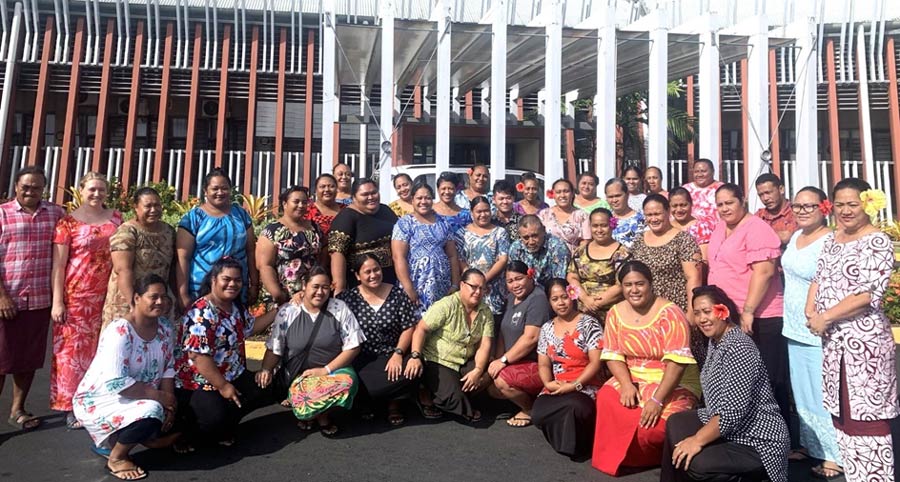
News and events
Pacific Research in Inclusive and Specialist Education (Pacific RISE) uses Technology and Innovation in School Project: Bridging Gaps Between Nations
Newcastle, Australia - April 29, 2024
The Pacific RISE group announces a pioneering initiative led by Associate Professor Angela Page in collaboration with teachers from St Therese’s Primary School. Mrs Melanie Faehndrich and Mrs Angela Schneider supported by the Catholic Diocese of Maitland-Newcastle were part of a larger project to deliver professional learning in Samoa.
This project marks a significant milestone in global education as it brings together research, expertise, and innovation to develop teaching and learning practices in the Pacific.
At the heart of this initiative is Moata'a Primary School in Apia, Samoa, where Associate Professor Angela Page and her team have demonstrated what the latest in Virtual Reality technology can do. Teachers from Moata’a Primary School, while engaging in professional learning, donned VR headsets to experience a prerecorded classroom session from Australia.
The utilization of Virtual Reality adds value to professional learning and provides a dynamic and immersive learning experience, but it also serves as a bridge between distant communities. Many of the teachers were unaware the technology existed and were overcome by the sense of difference between their own experience and what they were viewing from Australia.
However, while the Virtual Reality exercise was an exciting way to end the week-long session, it opened possibilities for future collaborations between the schools, not just for teachers but for students to connect in real-time.
Associate Professor Angela Page expresses her enthusiasm for the project saying, "This project shows Virtual Reality is not just a tool but a window to different worlds. It’s about giving Samoan teachers a chance to step into another classroom, feel its energy and rhythm as well as connecting across borders”.
Central to the philosophy of the project is the commitment to creating sustainable teaching practices through partnership with local communities. Only by working inside Pacific classrooms and with Pacific educators building relationships that reflect and respect the local context can meaningful change be made.
This project exemplifies the University of Newcastle's dedication to innovation, community engagement, and global education partnerships. As the project continues to unfold, it promises to inspire new approaches to teaching and learning, with far-reaching implications for inclusive educational practices in Pacific countries.
Expanding success to landmark Inclusive Education program, Apia, Samoa.
Newcastle May 1, 2024
The University of Newcastle is pleased to announce the expansion of its teacher training program following the overwhelming success of the Certificate in Teaching Support program held in 2023. Due to the high demand and positive feedback from the Ministry of Education and Culture in Samoa, the program has attracted funding from DFAT and extended to encompass inclusive education for all teachers.
Utilizing a framework developed by Associate Professor Angela Page and her team that included Tess Rendoth from the School of Education with the guiding principle of working in partnership with stakeholders and promoting local knowledge and practices, the Samoan government can take a more informed hands-on approach to inclusive education training.
On 22nd April Ministry of Education and Culture advisor Jennifer Seipua Pemila delivered the first of a 4-week training program ‘Inclusive Education Classrooms for All’ to a group of in-service teachers with the balance of the program to be completed across the next 12 months.
This project showcases the University of Newcastle's commitment to collaborating with Pacific communities, involving stakeholders, supporting capacity building and developing sustainability.

Women in Leadership: Developing capacity within disability inclusive education in Vanuatu
Thursday, 31 August 2023
Four research teams at the University of Newcastle are successful recipients of the highly competitive and prestigious Australia Awards Fellowships.
Funded by the Australian Government, the Fellowships will allow the University of Newcastle to build capacity and strengthen partnerships with countries in our region in support of key development and foreign affairs priorities as outlined at Australia Awards Fellowships.
Three out of the four projects are built on partnerships in the Pacific Islands region, supporting our commitment to the University’s Looking Ahead Asia Pacific Focus, supported by the Pacific Node and Office of DVC, Global Engagement and Partnerships.
One of the successful projects is 'Women in Leadership: Developing capacity within disability inclusive education in Vanuatu' by Dr Angela Page and Professor Susan Ledger from the University’s School of Education, a partnership with Vanuatu's Ministry of Education.
This Fellowship seeks to up-skill women in early to mid-career leadership roles within Vanuatu's inclusive education sector to enable them to develop effective policies to transform inclusive education and mitigate against disability discrimination in schools in Vanuatu.
Inclusive Classrooms Pilot Program, Samoa.
Newcastle, Australia, 21 November 2024
Pacific RISE researchers Assoc. Professor Angela Page, Dr.Kate Ferguson-Fitzpatrick, University of Newcastle and Assoc. Prof Joanna Anderson from the University of Adelaide extend a well-deserved faamalo atu (congratulations) to the principal and teachers of Moata’a Primary School, Apia, when receiving their graduation certificates in the inaugural Introduction to Inclusive Classrooms program.
The pilot program, headed by the University of Newcastle, is part of a broader professional development program for South Pacific educators that will be launched in 2025 as a United Nations CIFAI-accredited course in teachers' professional learning.
Fa’afetai (thank you) to Jen Seipua Afutiti Pemila and the Ministry of Education and Culture, Samoa, for their invaluable input into contextualising the learning to Samoan schools.

The University of Newcastle acknowledges the traditional custodians of the lands within our footprint areas: Awabakal, Darkinjung, Biripai, Worimi, Wonnarua, and Eora Nations. We also pay respect to the wisdom of our Elders past and present.